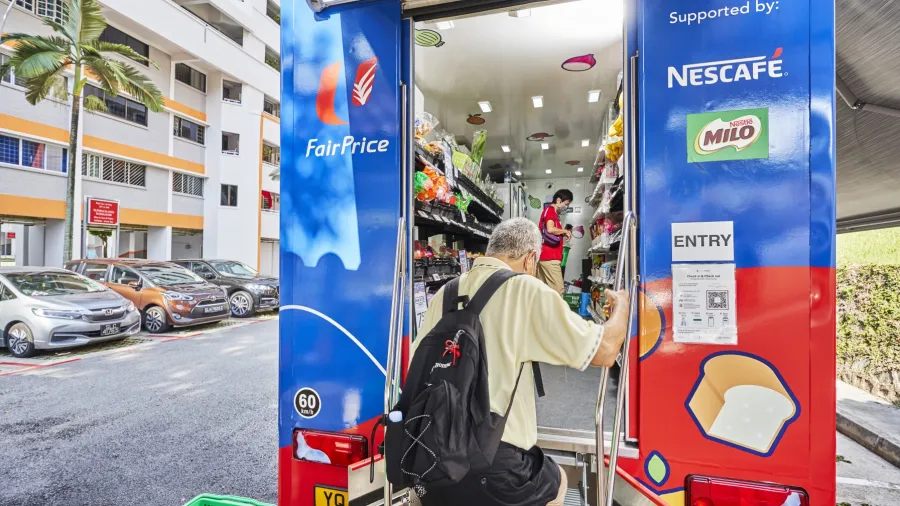
How NTUC FairPrice's consumer centric mindset became its golden goose
The "FairPrice on Wheels" community initiative brings daily essentials to mature estates with higher concentration of low-income seniors.
When the Singapore government implemented Dorscon Orange due to the spread of COVID-19, it was a supply nightmare for retailers as Singaporeans scrambled to get essentials.
In a podcast interview by Retail Asia, FairPrice Group’s Chief Executive Officer of Retail Business Elaine Heng called it a ‘baptism of fire’ in which they saw at least three rounds of panic buying in Singapore.
It was the return of the egg dilemma of 2004, but this time the country wasn’t just facing an egg shortage.
Logistics
With the borders closed, it wasn’t shortage of supplies that was the problem. It was merely the result of the problem that is getting the essentials from the source to the shelves.
As one of the largest grocery chains in the country Heng said they had to figure out how to get the goods from the warehouse fast enough.
“We had to reconfigure our supply chain, we had to reconfigure new warehouses. In fact, some of our warehouses were set up in five days. We had to use stores as a hub and spoke to ensure that we alleviate the tension points from our whole supply chain, and we use our bigger stores to send out and dispatch to the smaller stores.”
Supply resiliency
This disruption in supply wasn’t a first for Singapore. Back in 2004, the government placed a ban on eggs from Malaysia due to an outbreak of avian flu, which at that time Singapore imported 73% of its eggs from. Eggs prices at that time skyrocketed to as much as three times the cost.
Supply resiliency is an important concern for a country such as Singapore who imports 90% of its food and uses only about 1% of its land resources for agriculture.
Heng said that 90% is crucial to Singapore especially as Singapore is a small country. She agreed that the country requires resilience, especially in terms of food. And to ensure that, she said they have been working with the government to minimise disruption to the supply chain.
“The whole diversification strategy that we have put in place has actually paid off during this time. And the whole effort supporting locals has been amplified as well, very much aligned with the government's 2030 plan that we should have 30% of our food produced locally by 2030. So we work very closely with the government. Our teams have been very agile in terms of ensuring that we source from different countries and ensuring that even when borders are closed, we have the food sources coming to Singapore,” Heng said.
For its part, NTUC FairPrice implemented several multi-pronged strategies. When flights were cancelled and they couldn’t use freights, they brought essentials by land.
“As an example, we have contract farms in Chiang Mai. And what we did was to transport the produce by road via a relay team from Chiang Mai to Bangkok. And then from Bangkok to Kuala Lumpur to Johor Bahru, and Johor Bahru to Singapore. This forms a relay team where the drivers switch but the truck continues was one of the strategies that we have actually deployed during the circuit breaker period.”
This wasn’t the first time NTUC FairPrice stepped up during a crisis.
During the egg crisis of ‘04, the company was the first to bring in eggs from Australia and New Zealand to the country.
Today, they also worked closely with the government to make sure eggs, amongst other essential goods, would always be available to consumers.
Innovations continue
Before the pandemic, FairPrice had been experimenting with a frontline retail technology that allows customers to process their own transactions. It was the birth of the very first unmanned and cashless Cheers store back in 2017 at Nanyang Polytechnic.
In December last year, NTUC FairPrice opened a new one in Our Tampines Hub that was based on the success of the first version.
This ‘walk out’ technology concept store removes the need for long queues and is as easy as downloading an app in your smartphone.
But with an unmanned store, will pilferage go up? Heng said since the establishment, the numbers of pilferage have been very low, lower than their expectations.
Customer centricity
NTUC FairPrice doesn’t just dish out these innovations everywhere. According to Heng, it's really about the needs of the customer, the location, what exactly are the personas and the profiles and the shopping missions of customers.
They build the concept of these stores that would fit with the purpose and customers in mind.
“So as it stands now, there are plans right for us to look at more versions, but it is also a whole journey, as we look at the different formats of where we will actually grow,” Heng said. “Every store that we build has to be pivoted on the customer's profile, the needs of the customer. What are the shopping missions? How do we create stores and experience?”
One such store they tailored for its customers and locations is the one at Parkway Parade. Heng said they looked at the recent trends and acknowledged that their customers are getting more conscious about their health so they installed a kiosk where customers can take a quick look at the state of their health with on-site specialists.
In Parkway, they designed a cocktail bar right next to a kids’ sustainability zone where they make arts and crafts and play. Heng said that she was skeptical at first, but the team explained that they noticed there were a lot of young families. Parents came to relax and have a drink whilst their kids had fun playing and making arts and crafts.
“And I was like, okay, but what happens if single customers, without kids and all. Will they actually come as well? Because then it might be too noisy? But I was proven wrong by the team,” Heng said.
NTUC FairPrice has always come back to one thing: customer centricity.
“It's back to the point about customer centricity and really putting customers in the center of all that we do. When we look at the different customer demographics and profiles in this zone, we feel that there is actually a gap. And you know, we did not let the size of the store stop us from actually doing something. And therefore, this is how we innovate and stay relevant,” Heng commented.
Retail future
The omni-channel strategy may be the right one but Heng believes that even with the boost digitalisation has been experiencing due to the pandemic, shopping will still be based on shopping missions and making stores as destinations.
Heng thinks there will be times when consumers would just want to click a button and have their products delivered. Other times they would want to go to the store and pick their own products. They would want to interact with the employees that help them find what’s in season, what they can cook with what ingredients.
“We still believe that there is a role for stores and there's also a role for online. And I think the in between space would be the unmanned stores that we have launched like the Cheers stores where you can use scan and go and actually skip queues,” Heng added.
Heng believes that there isn’t a one-size fits all approach to shopping as customers continue to change what they want and what they need.
Factors such as store location, the type of consumers that visit these stores and a lot more can affect consumer behaviour.
“I think it really depends on the needs and the reason why people come to the store. There's different strokes for different folks and we shouldn't be looking at customers in a one size fits all approach,” Heng said.



















 Advertise
Advertise






